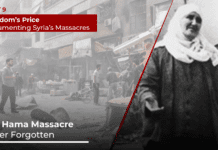
Confusion continues to swirl over the fate of Hezbollah’s leader, Hassan Nasrallah, following a series of Israeli airstrikes on the southern suburbs of Beirut late Friday night. Israeli officials indicated that the Hezbollah leader was the target of the strikes but have not confirmed whether the operation was successful.
At the news of Nasrallah’s potential demise, celebrations erupted in several parts of northern Syria, particularly in the city of Idlib. Hundreds of Syrians took to the streets, distributing sweets, setting off fireworks, and holding impromptu parades with cars and motorbikes to express their joy. For many Syrians, Nasrallah represents the leader of a group directly responsible for the murders, starvation, and displacement of thousands in support of the Assad regime. The celebrations reflected the deep-seated anger toward Hezbollah’s role in the Syrian civil war, where the group has fought alongside Assad regime forces against predominantly Sunni Arab areas.
The brutal strikes, which hit a Hezbollah stronghold in Beirut’s Haret Hreik neighborhood Friday night, caused massive damage and more innocent civilian casualties, adding to the already climbing toll from Israel’s attacks in Lebanon. Rescue workers are still combing through the debris, and local authorities fear the number of fatalities could increase as recovery efforts continue.
Nasrallah, who has led Hezbollah since 1992, became the focal point of the attack amid rising tensions between Hezbollah and Israel. Israeli sources speculate he did not survive, while Hezbollah, after an initial statement claiming Nasrallah was “safe,” has remained silent.
If confirmed, Nasrallah’s loss would mark Israel’s most significant strike against Hezbollah in years. Analysts suggest this could be a pivotal moment with major consequences for the group. “Hezbollah has been severely weakened by these strikes,” said Mohanad Hage Ali, a senior analyst at the Carnegie Middle East Center. “Nasrallah has been the glue holding together an expanding organization. If he is gone, it will be a serious blow.”
Despite this, Hezbollah has proven resilient in the face of leadership losses in the past. When Israel assassinated Nasrallah’s predecessor, Abbas al-Musawi, in 1992, Nasrallah succeeded him and strengthened Hezbollah’s power and reach. There is already speculation that Nasrallah’s cousin, Hashem Safieddine, who oversees the group’s political affairs, could step in as his successor.
Iran’s response will be key in determining the course of events, as Tehran has not always aligned perfectly with Nasrallah in recent months. Should his demise be confirmed, Iran could either escalate using Hezbollah’s substantial missile arsenal or seek to de-escalate the conflict to allow the group to regroup.
“This moment is fraught with danger for the entire region,” said Lina Khatib of Chatham House. “Nasrallah’s death, if confirmed, would severely weaken Hezbollah’s morale but would not destroy it. Israel, however, would claim a significant military and political victory.”
Experts caution that while Nasrallah’s removal would represent a tactical victory for Israel, Hezbollah’s power is entrenched in Lebanon, not just militarily but politically and socially. “Hezbollah is not just Nasrallah,” said Fawaz Gerges of the London School of Economics. “Even without him, the group has deep roots in Lebanese society and will likely regroup.” Despite the uncertainty surrounding the fate of its leader, Hezbollah will remain a continued threat to the region.








